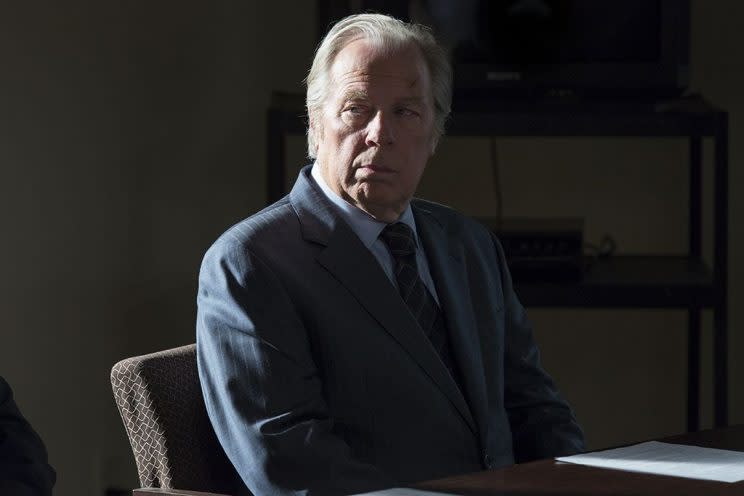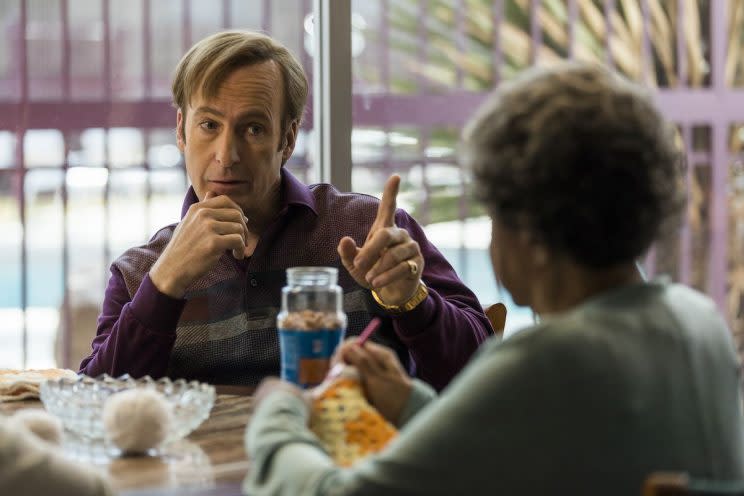‘Better Call Saul’: You Always Hurt the One You Love

Yes, Better Call Saul has been constructed so that it’s a show about how Jimmy McGill (Bob Odenkirk) becomes Saul Goodman, the weasel lawyer in Breaking Bad. But it’s also another, equally important, kind of show — one about the troubled, agonizing relationship between two brothers, Jimmy and older brother Chuck McGill (Michael McKean). Monday night’s third-season finale brought the brothers to the fore, tragically. Warning: Spoilers follow for the season finale of Better Call Saul.
An atypically brief pre-credit scene showed Chuck and Jimmy as young boys, with Chuck reading Jimmy a story late at night, Chuck comforting Jimmy’s fears. Then the always changing image behind the show’s title card showed a “World’s Greatest Lawyer” coffee mug falling off a table with a crash. That was a symbol of things to come. Soon enough, Chuck would finally be ousted from HHM by Howard, his career as a lawyer forced to end.
Chuck is a better lawyer than Jimmy in the sense that he has a sharper legal mind and approaches the profession like a chess master, able to see his opponent’s moves well ahead of time. Jimmy, by contrast, is a more savvy lawyer, more attuned to the way the law works for ordinary citizens. When Jimmy practices law, he’s not playing elegant chess in a quiet room; he’s playing a down-and-dirty three-card monte game on a busy sidewalk. The show’s finale, written by Gennifer Hutchinson and directed by Peter Gould — both working to create a tightly wound machine of action and emotion — found the latest of Jimmy’s schemes weighing on his conscience. It’s a conscience that is becoming increasingly weak and inconsistent as the series progresses, for we know that by the time Jimmy becomes Saul, he will have broken bad and will barely possess a conscience at all.

At this point, however, Jimmy is pained with guilt over the way he’s manipulated the senior citizens over the Sandpiper settlement negotiations. He sacrifices the fond feelings the elderly folks have for him in an attempt to return happiness to sweet old Irene, whom we saw being deceived by Jimmy last week. It’s a touching gesture of atonement, but Jimmy hates being hated, and every time he incurs another person’s ire, a little bit more of his soul dies, and the callous hardening of his heart increases.
The crucial scene occurs when Jimmy goes over to Chuck’s place to express genuine sympathy (and at this point, he doesn’t even know of Chuck’s ousting from HHM). Instead of bonding, however, they fall into a bitter quarrel about what they always fight over: their irreconcilable differences over how a man ought to conduct himself in life. “You’re just going to keep hurting people. … It’s what you do,” says Chuck, knowing how to hurt Jimmy in his most tender spot, the way brothers always know. Chuck urges Jimmy, with sarcastic bitterness, to recognize his great flaw, and to “accept it, embrace it.” Then Chuck delivers the final blow: “The truth is, you’ve never mattered all that much to me.”
It’s a devastating moment for both of them, and for us as viewers who are heavily involved in these men’s emotional lives. Among its best achievements is the fact that Better Call Saul tells us more about the inner lives of buttoned-up, stoic, ordinary men than nearly any other show on television right now. Chuck’s cruel dismissal of Jimmy sends them both into tailspins. Jimmy gives up the office he’d been running with Kim — poor Kim, in her arm cast and her depressed runs to Blockbuster for comfort movies! In shutting down the office, you feel that Jimmy is also shutting down one of the last vestiges of his lifelong attempt to be a solid citizen, an honest man to be admired. It’s just too hard; it’s not in the cards for Jimmy.
Chuck, meanwhile, is giving in to his own form of despair. With no job, no outward mantle of respectability, he’s a broken, lonely man. He succumbs to the disease he’s been so valiantly fighting. In an effort to alleviate the pain he suffers from his electromagnetic hypersensitivity, he starts rooting around his house for any stray electrical source. Unable to find every last one, he becomes obsessed, delirious, and begins cracking the plaster walls and prying away flooring and tiles — it was a feverish scene that recalled Gene Hackman’s breakdown in The Conversation.
By the end of the hour, Chuck is reduced to a trembling depressive. He intentionally kicks over a kerosene lamp — the “Lantern” of the episode title — and the scene cuts to outside, as we see the house go up in flames.
There were other elements to this episode, most crucially a thriller-movie escapade in which Nacho planned to ambush and murder Hector, only to have Hector collapse before Nacho could enact his plan and — sweet irony — Gus Fring ends up saving Hector’s dreadful life. What about Mike? Mike wasn’t around, but he’ll be back next season in full force.
Chuck, I’m assuming, will not be back next season. It doesn’t seem likely that Better Call Saul would do with Chuck what Homeland did with Peter Quinn — raise him from death to live another highly improbable day. If Chuck’s death is final, let’s appreciate how superb Michael McKean has been in every scene he’s had here. And then, remorselessly, let’s begin looking forward to the ongoing destruction of Jimmy McGill’s soul. Few TV shows have given me as much pleasure this season as Better Call Saul has.
Read More From Yahoo TV:

